Justice

In cities and towns across our nation, this weekend’s coordinated actions for the #BlackLivesMatter movement center on reclaiming Martin Luther King Jr.’s radical legacy. As you may recall, Missouri Gov. Jay Nixon and President Barack Obama — among others — invoked the nonviolence of King in their calls for peace following the non-indictment of Darren Wilson. As Martin Luther King Jr. Day approached, organizers had to field countless criticisms by white people telling them, “King wouldn’t approve of what you’re doing” and “I’ve studied his work, I know he wouldn’t react like you have.”
Based on comments like these, it stands to reason that white people in the United States may need a jolt of reality about King’s anti-capitalist agitation.
King was outspoken against capitalism’s oppressive clutch on both the national and global levels. King made it clear that racism and economics were intimately intertwined. I’m reminded of his classic quote, “What good is having the right to sit at a lunch counter if you can’t afford to buy a hamburger?”
King acknowledged that the discussion of class couldn’t be divorced from the discussion of race. While both conversations make us uncomfortable, somehow we would rather remember King as a civil rights leader only, and not also as a vocal critic of capitalism who instead favored a form of Democratic Socialism.
I often hear criticisms that protesters are disturbing the peace, employing overly aggressive tactics, and generally making people too uncomfortable. The hypocrisy in these claims is that King disturbed the peace, used aggressive tactics, and made people extremely uncomfortable. Why do we call for peace when what we mean is order?
USERS OF MAPS—that’s all of us—may suppose that what we see is factual, accurate, bias-free. Of course location, distance, elevation, and comparative importance are reliably shown!
Not so fast, says social activist and pastor Ward L. Kaiser. A map may be “right” in some ways but still dangerous to the way we live in the world.
Why? Because maps are layered with meaning. Surprisingly, their most important messages may lie beneath the surface. In his full-color book How Maps Change Things, Kaiser helps the reader to dig in and discover some of those hidden, mind-bending messages.
As a college chaplain I am acutely, sometimes painfully, aware of the often-hidden narratives and symbols that define us as individuals and as a culture. This book has helped me analyze how maps—an increasingly pervasive form of symbolic messaging and storytelling in our time—connect us to power and privilege or consign us to society’s also-rans.


Some people don’t like the idea of New Year’s resolutions, but I do. We often only use the word in the context of this season, but “resolution” is a nuanced noun. Some of its definitons include:
A firm decision to do or not to do something — see: intention, resolve, plan, commitment, pledge.
The quality of being determined or resolute — see: determination, purpose, steadfastness, perseverance,tenacity, tenaciousness, staying power, dedication, commitment, stubbornness, boldness, spiritedness, bravery, courage, pluck, grit.
The action of solving a problem, dispute, or contentious matter — see: solution to, settlement of, conclusion to, “the peaceful resolution of all disputes.”
In a world of seemingly endless conflicts, I sure like the sound of that. We need more of all of these qualities just now. All three meanings of resolution are wonderfully attractive to me — and timely for this brand new year. So here are my 10 resolutions for this 2015:

To be black in America is to listen to death daily. To hear mothers wailing at unnecessary funerals, to see fathers mourning lost sons, to offer graveside prayers that puncture the heart of God — this is the sorrow song of a people, and a nation, haunted by racism.
Over our heads however, I hear the sweet, dark sounds of freedom in the air, calling for the dry bones of democracy to arise from the segregated sinews of our society. The multiracial chorus of protestors chanting, "I can't breathe," the die-ins, the walk-outs, and the highway-halting actions of youth from New York to Chicago to Tallahassee to Los Angeles represent a thirst and hunger for righteousness that includes and yet transcends voting.
To join within this symphony of justice, I am calling faith communities to participate in a national #DialInForJustice during the month of December. The goal is to call the Unites States Department of Justice and local police departments, communicating our desire to see systemic reforms to policing in America. This initiative seeks to lift up faith-filled voices alongside the already existing trumpet blasts of groups like the Organization of Black Struggle, Dream Defenders, PICO, Sojourners, and so on.
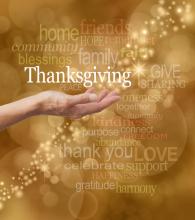
I'm grateful for the warm, safe shelter of my home when there are 610,042 experiencing homelessness on any given night in the U.S.
I’m grateful for more than enough to eat when there are 805 million people in the world do not have enough food to lead a healthy active live.
I’m grateful that I have clean drinking water when over 3.4 million people die each year from water, sanitation, and hygiene-related causes.
I’m grateful that I have good health when so many people do not have access to decent medical care, like the 5,459 people who have died from Ebola this year, and the millions more who die each year from preventable diseases.
I’m grateful I have clothing to wear when in the poorest of places, the lack of proper clothing costs lives, and hundreds of millions still live in conditions of material deprivation.
I’m grateful for my freedom when the U.S. had 1.57 million inmates behind bars, the highest percentage of a population of any developed country in the world.
I’m grateful for my citizenship when there are over 11 undocumented immigrants in the U.S. living in the shadow of constant fear.
But I’m especially grateful for the people I know, and the ones I don’t, that are working for justice and peace; a world where all our brothers and sisters have the basic necessities of shelter, food, clean water, decent medical care, and warm clothing. A world where every human being’s dignity is respected and valued. A world Jesus called the Kingdom of Heaven.
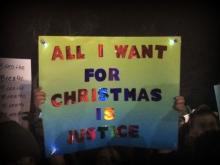
As I followed protesters along the National Mall after the non-indictment of New York City police officer Daniel Pantaleo, I was particularly struck by the comments of one black gentleman named Houston. Putting down a sign that said “Boycott Christmas,” he took a speaker, called for quiet, and, in the midst of the crowd, began to preach:
“We must move on to that new day in which justice will roll down like water, and righteousness like a mighty stream. It is time for black and whites to take hand and hand and move this nation beyond the pitiful historical dilemma … So black and white together, we must move on to where even the stones will shout out, ‘It’s time for America to be one.’”
“Amen,” someone shouted.
Amen, indeed.
Drawing on Amos 5:24 and Luke 19:40, Houston had brought the riches of a deep biblical tradition to bear on our contemporary political struggle. Like the early Christians, he called not only for justice but also for reconciliation between races. His faith had inspired him to act.
Or so I thought.
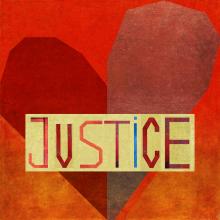
I am a professor of religion at a small liberal arts college in Decorah, Iowa. For the last two weeks in my Religion 239: Clamoring for Change course, students and I have been reading the book Occupy Religion: Theology of the Multitude. We have been discussing the issue of “justice,” and we have been playing with an image of God as one who works from the bottom-up on behalf of many rather than one who works from the top-down on behalf of a few.
A fundamental principle within this “bottom-up” theology is the idea of God taking sides (a view quite common in most of the “liberative” theologies). Many people, however, are often uncomfortable with the idea of God taking sides. They often assert that such an image contradicts the idea of an impartial and all-loving God who cares equally for all people.
A bottom-up theology of God asserts that God is a God who exists in relationship with all of creation at the same time every created thing is in relationship with every other created thing. While the relationships that involve human beings may be governed by several principles, I believe one principle that governs all human relationships is the principle of “justice.”
IN JANUARY 2012, I was driving in the flatlands of northern Indiana with historian and democracy activist Vincent G. Harding. I was Harding’s tour guide and chauffer for the week. As we drove he asked me what I hoped to happen at an upcoming meeting. “We’re open to whatever you feel inspired to share with us,” I responded. He replied, “Joanna, this is your community. I want to hear from you what is important in this conversation. You know better than I what your community needs to be discussing right now.”
This was the organizational formula Vincent Harding had been using for more than 50 years: Bring people together, remind them of the strength of their roots, listen to their wisdom, and connect them to a broader biblical and historical movement.
Harding, who died May 19, 2014, was a lifelong activist for the development of a compassionate, multireligious, multiracial democracy and a leading historian in the black-led freedom struggle in the U.S. Harding and his spouse, Rosemarie Freeney Harding, who died in 2004, had been colleagues of Martin Luther King Jr. and Coretta Scott King in the 1960s, and Vincent later became the first director of the Martin Luther King Jr. Center in Atlanta.
When historian, author, and longtime friend P. Sterling Stuckey heard about Harding’s death, he said he found it hard to believe because “Vincent was larger than life.” Harding’s effect on movements for justice in the U.S. was far-reaching. He was a convener of scholars, activists, artists, youth, and people of faith. He believed that transformation happened when everyone was engaged and contributing—and he believed that everyone had something to offer in the creation of a compassionate, multiracial democracy.

A while back, a blog post speaking into the pain of miscarriage was making its rounds on the Internet. Having never miscarried (that I know of), or grieved the death of any child, I asked my friend who lost her two-month-old son whether she felt highlighting the pain of miscarriage diminishes the story of her own tragedy. She replied:
“It is not very helpful to compare pain.”
But how often do we do just that? There is a phenomenon of what I call, “First-World-Problem-Shaming,” where we make people feel bad about their anxieties because somewhere in the world children are starving. I don’t know about you, but in general, I feel WORSE after being reminded of greater problems in the world in response to my petty issues, not better. We compare our pains, assigning degrees of severity attached to the problem, deem one pain more worthy of compassion than the other, and manage one another’s grief as if it can be contained by our metrics. Yet everything we know about grief is that it defies our expectations, bowling us over unsuspectingly or releasing us with surprising turns. Everyone grieves in their own way.
This dynamic carries over to the way we do justice.

AS CHRISTIANS concerned about peace and justice, this time of crisis in the Middle East provides us an opportunity to return to our principles, the “springs of living waters” for people of faith:
- We need to oppose both anti-Semitism as well as any form of discrimination and racism against Palestinian Arabs. Solutions that promote or tolerate discriminatory and racist institutions and practices should be forthrightly condemned. Settlements, illegal under international law and discriminatory against Palestinians, need to be rejected rather than tolerated and legitimized.
- We need to work for justice, which requires that we work for a solution that levels the playing field rather than seek a “realistic” approach that reflects the balance of power between the parties, necessarily favoring the strong against the weak.
- We need to seek reconciliation and peace between the parties, rather than assuming eternal hostility and enmity between the parties.

Over the years, I’ve been given by some the mini-reputation as a leader in the field of justice. At first, I took it as a compliment and of course, I still do because I care a lot about justice. I know that people mean well. But I care about justice not just for the sake of justice. I care about justice … because I care much about the Gospel.
And sometimes, when I hear folks talk about justice in the church, I cringe …
I cringe because if we’re not careful, we’re again compartmentalizing justice rather than seeing it as part of the whole Gospel; We need to see justice as a critical part of God’s character and thus, our discipleship and worship.
Just like we shouldn’t extract the character of “love” or “grace” or “holiness” from God’s character, such must be the case with justice.
People often ask me, “What’s the most critical part about seeking justice?”
My answer:
We must not just seek justice but live justly. Justice work and just living are part of our discipleship. Justice contributes to our worship of God. Justice is worship.

I don’t know about you, and the people you know, but most people I know who call themselves Christians are particularly proud of the certainty that they are ‘good enough’.
It’s an odd phrase when you think about it; in a world simmering with chaos, injustice and upheaval, oppression, poverty and human trafficking, in our cities filled with addiction and unrest, our prisons cramped and over-flowing, do any of us really believe that the best we can do is ‘good enough’?
Can many of us actually congratulate ourselves, or our faith communities for our impact on our neighborhoods, schools or cities?
IN JUNE, SOJOURNERS decided to take part in a little experiment. What would happen if 300 faith and social justice leaders gathered together for a few days to discuss some of the most pressing issues of our time? Our first ever Summit, under the leadership of chief strategy officer Timothy King, had as its tagline: “World Change through Faith and Justice.” Only time will tell how this experiment will play out in the long run, but in the short term I would consider it a great success.
Held over four days in June at Georgetown University in Washington, D.C., the conference brought together 296 leaders from churches, faith-based organizations, NGOs, media outlets, business, and politics. Fifty-three percent of attendees were female, and half were people of color; they were drawn from a wide range of Christian and other religious and spiritual backgrounds.
On the first night, when I saw who was there, I knew the Summit was going to be a powerful and wonderful time. Some participants were local Washingtonians. Others came from as far away as Ethiopia to attend. The group included icons of the social justice movement such as Ron Sider, Marie Dennis, Yvonne Delk, Otis Moss Jr., and Tony Campolo as well as newer leaders such as Otis Moss III, Rachel Marie Stone, and Daniel Varghese, a Georgetown undergraduate who celebrated the Summit’s “radical egalitarianism.” As Timothy King mentioned in our opening session, the group looked a lot like the kingdom of God!
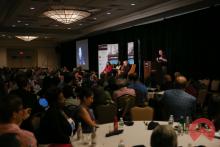
Editor’s Note: We at Sojourners thought it would be nice to share first-hand reflections on our inaugural annual conference, The Summit: World Change Through Faith & Justice, from participants. Our first post comes from Sara Johnson, who hails from Ennis, Mont. and is the founder of the Million Girl Army, a brand new non-profit launching this year focused on engaging middle school girls in the U.S. on gender justice advocacy. Sara is an emerging leader who was able to attend The Summit because of a sponsorship from one of our Change Maker donors. The donor covered all of Sara’s costs, from registration to travel and had a tremendous impact on Sara’s work, as she shares below.
Although nervous to be a founder of a non-profit that hasn’t officially launched yet attending a conference with heavy hitters in the non-profit world, within seconds of walking into the initial Summit gathering I was glad I came.

The interesting thing about human nature is that even among the oppressed, people will seek supremacy, a pecking order. We human beings have great capacity for tenderness and compassion, and we’re also the meanest things in the world! And even when we are oppressed together, we will try to find some advantage or superiority over others.
“As for you, my flock, saith the Lord, I shall judge between sheep and sheep, between rams and goats. Is it not enough for you to feed on the good pasture, but you must tread down with your feet the rest of your pasture?”
In other words: Do you have to get what’s yours and at the same time mess it up for others?
FAITH-ROOTED Organizing: Mobilizing the Church in Service to the World outlines a theological cartography of social change. In this critical intervention, Alexia Salvatierra and Peter Heltzel reimagine—and as a necessary consequence, rechart—the landscape of vision, action, and strategic planning needed for social change.
Full disclosure: I have attended several trainings conducted by the co-authors. Indeed, the dual authorship of the text is a principal strength. Faith-Rooted Organizing blends the voice of an evangelical-activist theologian in Heltzel with the homespun profundity of a seasoned pastor and campaign organizer in Salvatierra. The authors delight readers with complementary writing styles: Heltzel speaks through theological propositions, interpolated intermittently with jazz references and theological punch lines; Salvatierra communicates through proverbs, organizing anecdotes, poignant biblical passages, and narrative side notes.
The result is a well-argued and accessible text that should resonate from the seminary to the sanctuary. Their driving thesis is that faith communities, especially Christian ones, should organize for social change in a way that is rooted and guided by the stories, symbols, sayings, and scriptures of our faith. Faith-Rooted Organizing functions as an instruction manual on effective advocacy while providing a theological rationale and vocabulary for a vocation marked by tremendous victories and colossal failures, breakthrough partnerships and fragmented coalitions, glimpses of beloved community and portraits of democracy stillborn.
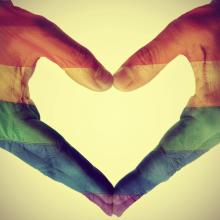
MOST discussions about the Bible and homosexuality are limited to a handful of passages and the subject is viewed as a moral issue in which the burden of proof is placed on lesbians and gay men to defend our right to be who we are in light of those passages. If we approach scripture understanding that heterosexism, like sexism and racism, is a justice issue, then we move to a different plane of inquiry.
We might then understand that what is at stake in questions of sexual morality is not sexual orientation per se but rather the rightful or wrongful use of sexuality whatever our orientation. Sexual sins can occur in both heterosexual and homosexual relationships wherever people are exploited, abused, neglected, or treated as objects. On the other hand, love, commitment, tenderness, nurture, respect, and communication can be expressed in both homosexual and heterosexual relationships.

Can you imagine sitting in a public space and all of a sudden everyone around you starts to speak in a different language? And yet somehow you still understand them? Can you imagine the cacophony of sounds this event would cause? Can you envision the power it would take to make this astonishing moment happen?
Is it a miracle? Possession? Paranormal activity? It likely would freak you out.
This moment actually happens more often than we think. A glimpse of this cacophony of sounds can be found in our everyday lives. We hear loud voices coming through network and cable news shows, on Twitter and Facebook, and through other social media outlets. We hear rising decibels of chatter around social justice issues — from the right and from the left — about issues as diverse as abortion, same-sex marriage, income inequality, biblical obedience, or defining traditional values. We hear the noise. At times, it is almost deafening. The voices seem to fly past each other so fast that neither side seems to be listening to the other at all.
But then there are moments when we all come together to speak for one common purpose.
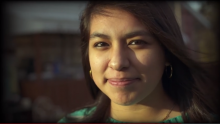
The people we meet change our lives. Through hearing the stories and learning about the lives of others, we are transformed. And, it is for exactly those reasons that I hope you’ll watch this short trailer and sign up to be one of the first people to watch The Stranger.
The Stranger is a new 40-minute documentary created to introduce Christians to the stories and lives of immigrants living in this country. Interviews with pastors, Christian leaders, and policy experts provide a biblically based context for the immigration challenges that face our country today. The film, commissioned by the Evangelical Immigration Table, was produced by Emmy-award winning producer Linda Midgett.